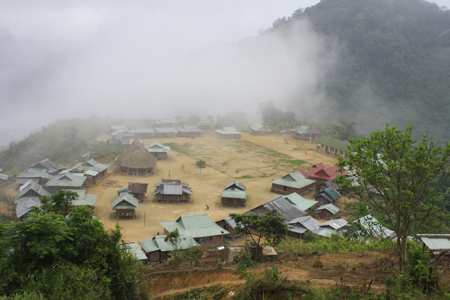Tay Giang District in the central province of Quang Nam can be said to be a new tourism find in Vietnam.
But it has the added attraction of not being spoilt by tourism and we can only hope it stays that way.
Located on the west side of the Truong Son Range at a height of more than 1,300 meters, the district alluringly presents its vast terrace fields and green mountains draped in gently swaying fog.
One early morning, as we left Tay Giang Town for the district, the fog was more airy and the scene more ethereal than usual. The high and tricky slopes like Khom Lung (hunchback) that we had to navigate on the way kept our feet firmly on the ground, however.
On reaching Tay Giang, which borders Laos’ Sekong Province and Vietnam’s Thua Thien–Hue Province, we could see that the area, once clearly poverty-stricken, now hosted tidy, spacious houses, so much that several villages could lay claim to being dubbed “Singapore Villages,” a la Aur Village in the district’s Ch’om Commune.
This is a welcome lesson to all tourist spots in Vietnam. That it pays to pay attention to keeping the place clean and tidy.
Moreover, despite the changes and local authorities’ plans to promote community-based tourism, the district seems to have escaped commercial proliferation so far.
Maybe that is yet another tourism lesson to be learnt: Minimal interventions into ethnic minority residents’ lives for whatever reasons will keep areas clean and culturally and environmentally authentic, not to mention sustainable.
Let us keep our fingers tightly crossed.
The Co Tu people’s traditional long thatched-houses in Aur Village are built to host large families, and the number of rooms depends on the number of family members. Some houses can be several dozen meters long.
One of the more prominent annual festivals of the Co Tu include dam trau (buffalo sacrifice), held between December and March on the lunar calendar to show gratitude to gods for giving the people a good year. Another festival celebrates or prays for a good rice crop.
In keeping with the new tourism trends, visitors can observe the traditional events as outsiders or choose to live for a few days with the Co Tu people, enjoying specialties that are cooked in bamboo sections, like com lam (bamboo-cooked rice), thit lam (bamboo-cooked meat), and san lam (bamboo-cooked cassava).
Visitors should not pass up on the opportunity to try out famous local beverages like Ta Vac, which is fermented from the extract of a native fruit with the same name. Tasting somewhat like Western wine, Ta Vac is believed to enhance one’s health. It is a precious drink for locals, and with typical generosity and hospitality, they treat with their guests with it.
Not far from Aur is the Zo Ruot Village, which hosts a garden of 5,000 Ngoc Linh ginseng (Panax vietnamensis) roots, said to have life-saving properties.
The garden, estimated to be worth tens of billions dong, or hundreds of thousands dollars, was founded in 2004 when district authorities transplanted them from Nam Tra My District.
No visit to Tay Giang is complete without the obligatory photographs of the long, terraced fields that the farming genius of ethnic minority communities has gifted to the country, as also the world at large. If you do not want to take photographs, the time is well spent just gazing at an unforgettable scene.




Comments